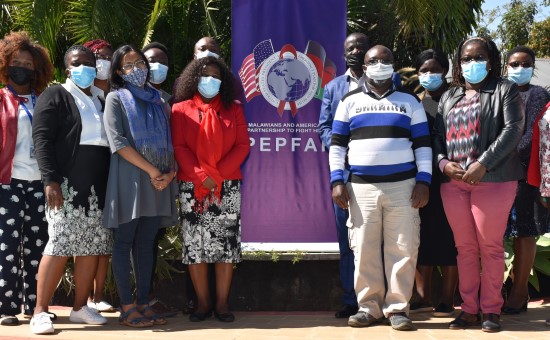
06 Jul Standardizing Health Care Worker Lay Cadres Begins in Malawi
As Malawi nears HIV epidemic control, standardizing the roles and responsibilities for health care workers at the community and facility levels is a key step in maximizing the country’s HIV efforts. This month, PEPFAR Malawi, jointly with the CDC, USAID, and HRH2030 Malawi, hosted a two-day workshop with PEPFAR’s community-based and facility-based partners to kick start the lay cadre standardization process, which ultimately will ensure harmony among PEPFAR implementing partners, enhance efficiency of the PEPFAR program, and provide a pathway to formally transition the key lay cadres to the Government of Malawi’s health system in the future.
Lay cadres—health care workers who provide HIV/AIDS clinical support services and perform some of the same functions and tasks as professional health care workers do but who lack the same level of formal education and training as well as Government registration—have contributed significantly to Malawi’s epidemic control efforts. There are 44 lay cadre titles currently being used in country, including community health workers, community health worker counselors, community mobilization assistants, patient supporters, expert clients, HIV diagnostic assistants, outreach workers, and peer mentors, to name just a few. These health workers support health service delivery in the communities and facilities where they live, and until now, have not been recognized as part of Malawi’s formal, government health system.
The workshop, which brought together 10 partner organizations and was attended by more than 21 participants, built on the HRH inventory analysis done in 2020 that examined the variation in lay cadres’ roles and responsibilities, job titles, compensation, and requirements for recruitment and training. In April 2021, a newly formed Human Resources for Health (HRH) Standardization Taskforce was established to carry the standardization work forward, with the workshop being the first group activity. The key outcome of the meeting was consensus on standardizing the current 44 lay cadre job titles to eight titles; task force members also agreed on which cadres would need to be transitioned to government in the future and which will remain as project staff, based on their roles in HIV/AIDS services and epidemic control. The group also made progress on a draft HRH lay cadre standardization roadmap, which will guide the process toward the final implementation on the newly standardized cadres, expected to take place in 2022/23.
“The completion of this workshop is a first step, with many decisions still to be made around the complex, sensitive subject of harmonizing HRH investments and fully integrating community health workers and other lay cadres into Malawi’s formal health system,” said PEPFAR Coordinator Funmi Adesanya. “Over time, the taskforce must also engage and come to consensus with key government counterparts and other partners that support the recruitment of lay cadres, like the Global Fund, in order to ensure sustainability of these HRH investments.”
With the success of this meeting in bringing so many partners to agreement across many key areas, participants are motivated to move forward and eager to continue the process that will support Malawi to attain its health objectives and achieve and sustain HIV epidemic control.





